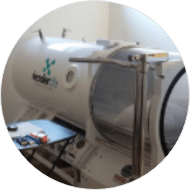Our Approach
 Advanced Treatments for Peritoneal Cancer
Advanced Treatments for Peritoneal Cancer Top-Rated Physicians
Top-Rated Physicians Personal Care
Personal Care Patient Satisfaction
Patient SatisfactionOur Patient-Centric Medical Facilities
At New Hope Unlimited, we pride ourselves in providing superior comfort, cleanliness, and cancer care at our 8,000 square foot medical treatment center in San Luis Rio Colorado, Mexico. We worked with renowned architects and contractors to create the ideal space for recovery, which includes state-of-the-art lounge areas and spacious private in-rooms that assure the comfort of our patients and their loved ones. To make our patients feel right at home, we equip each private ward with high-definition U.S. television, quality bedding, and high-speed internet connection. And with proper nutrition playing a vital role in cancer recovery, New Hope Unlimited also fulfills the dietary needs of each patient using fresh, organic produce to prepare breakfasts, lunches, snacks, and dinners. Comfort and cleanliness are also strictly implemented in our medical treatment rooms, which are equipped with the latest medical supplies and technology to provide the highest standard of care and treatment. Our medical center also has an in-house Hyperbaric Chamber, a well-established therapy for decompression sickness, exclusively available for our patients’ use. Further, New Hope Unlimited has maintained its exceptional partnership with Hospital Migoo, a medical group composed of certified physicians and specialists committed to our patients’ care and well-being.Stories of New Hope
Life-changing tales of our cancer patients and survivors.
FAQs
1. How will New Hope Unlimited customize my treatment?
The type of treatment you receive depends upon:- The stage and grade of the cancer
- The size and location of the cancer
- Your age and overall health
2. Is peritoneal cancer and stomach cancer the same?
Primary peritoneal cancer is not the same as gastrointestinal or stomach cancer. It also differs from cancers that metastasize (spread) to the peritoneum. PPC begins in the peritoneum, hence the term primary peritoneal cancer.


